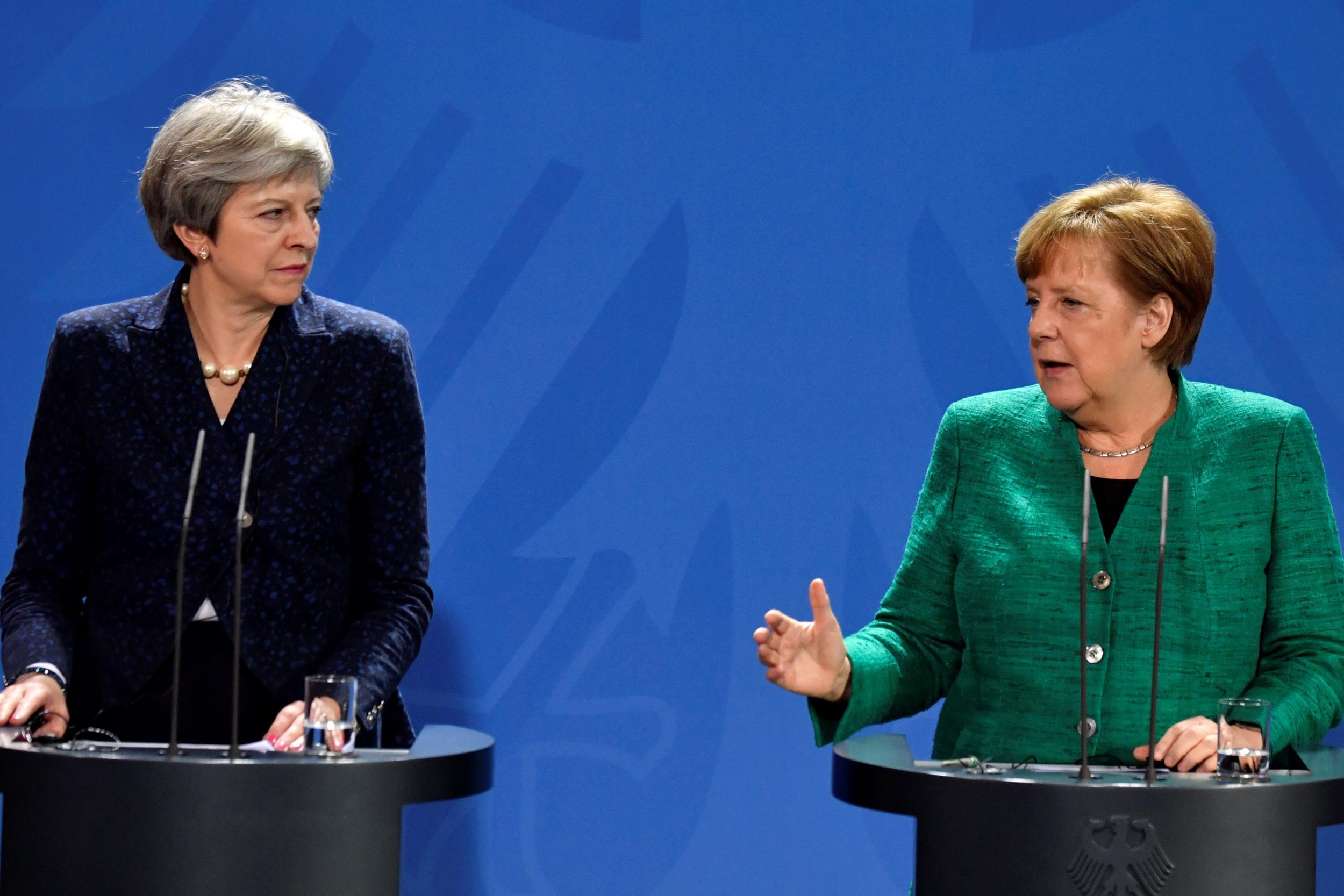Angela Merkel is right to be curious about Theresa May’s Brexit plans
Ms Merkel simply asked for one thing – that things 'work' the day after the transition period ends, so that EU and UK citizens can still access health care and catch flights

At first glance, Angela Merkel and Theresa May have much in common. Both began their rise to the top of their male-dominated professions in the 1990s; both lead right-of-centre parties; both suffered setbacks in their last national elections; both head minority governments. Happily, they also agree on many of the great international issues facing the West.
As they reiterated in their joint press conference in Berlin, there is a genuinely shared commitment to the multilateral approach to Iran, in marked contrast to Donald Trump; a common belief in the need to combat Isis and the terror it has brought to both countries; agreement on Syria and Ukraine; agreement on the “Berlin Process” for the rehabilitation of the western Balkans; and both, as an aim, wish to minimise the disruption caused by Brexit. Given Germany’s healthy trade surplus with the UK, this aspect of Brexit concerns the Ms Merkel more than some of her counterparts.
Ms May, not famed for her sense of humour, has apparently taken reports of the German Chancellor poking fun at her in her stride. Neither woman responded to reporters’ mischievous questions about “making an offer”.
While sticking to the solidarity of the EU approach, which is to delegate it all to Michel Barnier and the European Commission, there were hints that Germany isn’t prepared to ignore events in Brussels and leave everything to the Eurocrats. The Chancellor made clear that her administration remains in touch with the EU negotiators, and there is good reason for that, so much does Germany value the UK’s partnership.
The German Chancellor didn’t in fact rule out a “bespoke” deal, though perhaps not one that constitutes “cherrypicking”. If the UK wishes to “deviate” in certain areas from the single market, and presumably the customs union, Angela Merkel would “vet” those areas. That, in fact, is the kind of approach already followed with other EU neighbours such as Turkey and Switzerland – some sectors, agriculture, perhaps, or manufacturing, being inside the EU “club”, and others outside. This perhaps is what she had in mind when she said Germany would support a “balanced approach”.
Indeed at times Ms Merkel seemed to be saying to her British friend that if only Ms May would reveal which cherries she’d fancy then the Germans could go away and at least price them up.
The shape of Brexit that is emerging, then, is not so much cake-and-eat-it but more keeping half of the cake but eating the other half. Such are the grounds for optimism, though Ms Merkel’s formulations were sufficiently vague to allow any number of actual outcomes. Practical and clear-headed as ever, Ms Merkel simply asked for one thing – that things “work” the day after the transition period ends, so that EU and UK citizens can still access healthcare and catch flights.
It is equally clear, however, that the German government is, as Ms Merkel politely put it, “just curious” about what Britain’s policy actually is – what Britain wants and where it wishes to “deviate” from the current EU member arrangements. Hers was certainly a less adamant attitude than Mr Barnier’s. Much then depends on how far Berlin defers in these matters to Brussels, and how the Chancellor's new Social Democrat coalition partners support her if she insists on being placatory towards the British in some wider long-term European interest.
Still, it has always been clear that Germany has no option but to put the stability and integrity of the 450-million-strong EU single market and its “four freedoms” ahead of the slow-going UK market of some 60 million, albeit on a lucrative one for German businesses. Germany needs the EU more than it needs Britain – that much is self-evident.
Germany is, in fact, one of most integrationist of the EU powers, although German voters have recently shown some signs of disenchantment. With the exception of the extension of economic governance for the eurozone and its weaker banks, about which Germany’s taxpayers are understandably wary, successive German chancellors have aimed unashamedly to create a European “superstate”, the United State of Europe so loathed and feared by British Eurosceptics. Ms Merkel is, after all, the protégée of Helmut Kohl, architect of the European single currency and the most Europhile of Germany’s postwar leaders.
Does Germany welcome close cooperation with the UK on intelligence, security and defence issues after Brexit? Of course, though it is Theresa May who once foolishly tried to use security cooperation as bargaining chip in the Brexit discussions. The Prime Minister has wisely abandoned that stance, and will have won much credit from her German allies for her declaration that the UK is “unconditionally committed to European security arrangements”. She will make similar noises at the Munich security conference to a wider audience, including top American officials.
Security, international cooperation and a common commitment to Nato – those are the easy wins, and genuine ones for Europe as a whole, but the contrast with the discussions on trade and economics could not be greater. Germany has a clear – federalist and integrationist – idea of what it wants from the EU, and has spent the past 70 years pursuing it single-mindedly. If they can help the British with Brexit they surely will, but not at any cost. It is still the British who cannot quite make their minds up about Europe. Ms Merkel is still waiting for the British to make the EU27 including Germany an offer – and they have time on their side.

Join our commenting forum
Join thought-provoking conversations, follow other Independent readers and see their replies